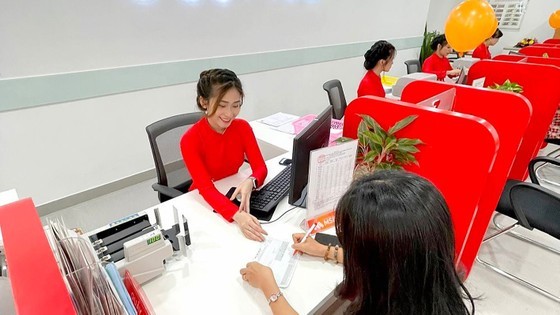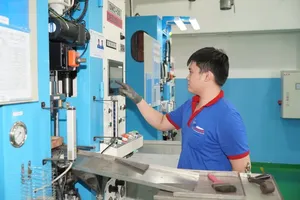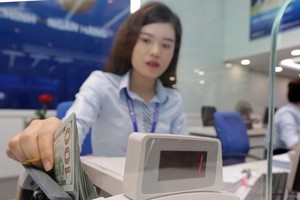
 |
Maritime Commercial Joint Stock Bank (MSB) has announced plans to submit a proposal for the merger with another bank at the upcoming 2023 shareholders' general meeting in April. (Photo: SGGP) |
The "Restructuring the System of Credit Institutions Associated with Handling Bad Debts between 2021 and 2025" project states that the banking industry must address weak banks by 2025. Additionally, the Government's recent Resolution No.31/NQ-CP has directed the State Bank of Vietnam (SBV) to prioritize the effective management of weak commercial banks. These measures are essential for promoting a sound and robust economy.
Disclosure of merger deals
Currently, the restructuring process includes five commercial banks, which are Dong A Bank (DongABank), Construction Bank (CBBank), Ocean Bank (OceanBank), Global Petroleum Bank (GPBank), and Petrolimex Petroleum Bank (PGBank). PGBank is undergoing restructuring, with capital transfer or merger being a likely direction due to its major shareholder and founder, the National Petroleum Corporation, being unable to continue investing and holding the bank according to regulations.
Several mergers and acquisitions have been taking place recently. After receiving approval for a bank merger plan in 2022, Vietcombank's leaders announced the completion of the compulsory transfer plan earlier this year. This process is being expedited to meet the SBV's timeline.
Based on a report on the progress of the Government's 2022 socio-economic development plan, there are indications that Vietcombank may be required to undertake the compulsory transfer of CBBank. Vietcombank was previously mandated to assist in the restructuring of CBBank when it was compelled to be repurchased at zero value due to losses and negative capital. Similarly, OceanBank is expected to merge with MBBank (Military Bank) after obtaining approval for the merger plan. MBBank estimates that it will take approximately 7-8 years to manage all the accumulated losses that will be transferred from OceanBank.
In 2022, in addition to presenting a proposal to sell 15 percent of its shares to foreign strategic investors (which was completed by the end of March 2023), VPBank also submitted a plan to restructure weak credit institutions to its shareholders. The option that many experts anticipate is that VPBank will participate in the restructuring of GPBank. The Board of Directors of HDBank also proposed to its shareholders the compulsory transfer of DongABank, a specially controlled commercial bank. After HDBank participated in the restructuring, the transferred bank was required to operate as a one-member limited liability bank since HDBank owns 100 percent of the charter capital.
A senior executive at Maritime Commercial Joint Stock Bank (MSB) has announced plans to submit a proposal for the merger with another bank at the upcoming 2023 shareholders' general meeting in April. The executive stated that MSB is currently evaluating and selecting a suitable bank that aligns with their development goals for the merger to help to increase the bank's scale more quickly. PGBank is reportedly one of the banks that MSB is interested in.
Financial experts predict that the forthcoming weak bank mergers will be different from previous ones, which resembled "marriages" between two credit institutions. The forcedly-transferred weak bank will operate as a one-member limited liability bank as the transferee bank is the sole owner of 100 percent of its charter capital and is an independent legal entity.
Foreign room expanded to 49 percent
Commercial banks participating in the restructuring of banks are not only considered by the SBV for higher credit limits, but weak banks that merge with banks can also be allowed to increase the foreign ownership limit, or foreign room, from the current 30 percent to 49 percent. The SBV proposed to the Government to amend Decree No.01 to allow credit institutions receiving a compulsory transfer to exceed the 30 percent foreign room rate but not more than 49 percent of the charter capital. This regulation does not apply to commercial banks with more than 50 percent State-owned capital. Among the five commercial banks intending or planning to receive the forced transfer of weak banks, only Vietcombank, a State-owned commercial bank with over 50 percent State capital, is exempt from this policy. The other commercial banks are likely to be able to extend their foreign room to a maximum of 49 percent.
According to the SBV, two forcedly-transferred commercial banks have proposed to raise their foreign room to 49 percent and are advocated by the SBV. The aim is to encourage foreign investors to invest in the restructuring of weak banks and to provide favorable conditions for the successful implementation of compulsory bank restructuring plans, thus contributing to the stability of the banking and financial system, as well as the economic and social stability.
In reality, the foreign room ceiling applied to credit institutions in Vietnam is currently set at 30 percent, which experts believe is no longer suitable for the capital ownership needs of foreign investors in the banking sector. However, the SBV believes that the expansion of the foreign room should not be applied to all credit institutions but only encourage foreign investors to invest in weak credit institutions and credit institutions undergoing transfer.
























